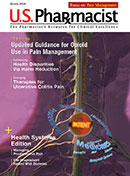In a recent publication in the journal Transplant Infectious Disease, findings reveal that fully vaccinated solid organ–transplant recipients (SOTRs) may have an almost 80% decrease in COVID-19 infections compared with transplant recipients who are not fully vaccinated. In the study, Aslam et al attempted to evaluate the incidence rate of COVID-19 in vaccinated versus unvaccinated SOTRs. The researchers collected clinical data from the Department of Medicine at the University of California, San Diego (UCSD).
The researchers examined data based on individuals' age, gender, vaccination type, and status. The study included 2,151 SOTRs, including liver, kidney, lung, and heart from a single center; 64.6% of participants were males; and the average age was 57 years. Among 2,151 SOTRs, 912 were fully vaccinated and 1,239 were controls (1,151 unvaccinated, 88 partially vaccinated). Of the study population, an estimated 70% of vaccinated subjects received the mRNA-1273 vaccine.
There were 65 cases of COVID-19 that occurred during the study period—four occurred among fully vaccinated individuals and 61 among controls (including two in partially vaccinated individuals). The incidence rate for COVID-19 was 0.065 (95% confidence interval [CI], 0.024-0.17) per 1,000 person days in vaccinated versus 0.34 (95% CI, 0.26-0.44) per 1,000/person days in the control group; incidence rate ratio (IRR) was 0.19 (95% CI, 0.049-0.503, P <.005). There were no COVID-19-related deaths in the four breakthrough infections and two of 61 (3.3%) among controls.
Aslam et al concluded that their findings demonstrate real-world clinical effectiveness of COVID-19 vaccination in SOTRs with an almost 80% reduction in the incidence of symptomatic COVID-19 versus unvaccinated SOTRs during the same time. Aslam et al indicated that prioritizing at-risk subsets of transplant recipients based on immunologic profiles and clinical characteristics for a third vaccine dose could be considered. They added that limitations of their study included the single-center cohort and the possibility of underreporting of vaccination status. Lead author Dr. Aslam wrote, "Almost half of the study population was unvaccinated, and thus there is a great need to improve outreach activities in the transplant community to promote COVID-19 vaccination."
Coauthor of the study and Chief of Transplant and Hepatobiliary Surgery at UCSD Health, Kristin Mekeel states, "These findings are encouraging for a couple of reasons. First, it demonstrates real world clinical effectiveness of COVID-19 vaccination in a vulnerable population. Second, the effectiveness is better than expected, given that studies have found that only about half of solid organ transplant recipients develop detectable anti-spike antibodies after vaccination."
Dr. Aslam, professor of medicine at UCSD School of Medicine and medical director of the Solid Organ Transplant Infectious Disease Service at UC San Diego Health, stated, "The results underscore the importance for transplant patients to get vaccinated against COVID-19 and to not focus on antibody levels alone. However, vaccine protection is not perfect and so it's important to continue to mask and socially isolate as well, and to encourage household members to get vaccinated, especially given the current COVID-19 surge in San Diego."
The content contained in this article is for informational purposes only. The content is not intended to be a substitute for professional advice. Reliance on any information provided in this article is solely at your own risk.
« Click here to return to mRNA Technology Update.
Published September 21, 2021






